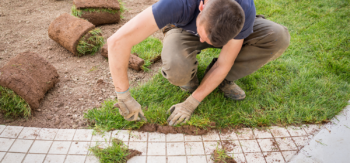As summer transitions into fall, lawn care needs shift to prepare for the cooler months ahead. In North Texas, where weather can be unpredictable—swinging from hot, dry conditions to sudden cold snaps—it’s essential to maintain a healthy lawn. By addressing your lawn’s needs in the fall, you’ll help it thrive during winter dormancy and bounce back strong in the spring.
Here’s a comprehensive guide on what to put on your lawn this fall to keep it lush and healthy.
Fertilizer: Feeding for Strength

Fall is the most critical time to fertilize your lawn in North Texas. After enduring the intense summer heat, your grass needs nutrients to repair itself and prepare for winter dormancy. Apply a slow-release fertilizer with a higher concentration of nitrogen (N) to promote deep root growth and store essential nutrients for spring.
Look for a balanced fertilizer like 18-24-12, which has a mix of nitrogen (N), phosphorus (P), and potassium (K). Nitrogen will aid in greening up the lawn, phosphorus helps with root development, and potassium strengthens the grass to withstand stress.
Timing Tip:
Aim to fertilize in mid-to-late October, as the soil temperatures start to cool. This timing allows the grass to absorb nutrients without overstimulating top growth.

Pre-Emergent Herbicide: Defending Against Weeds
Fall is also an ideal time to apply a pre-emergent herbicide to prevent winter weeds such as henbit, chickweed, and poa annua from taking over. These weeds germinate as temperatures cool, growing slowly during the winter and becoming a nuisance by spring.
Pre-emergent herbicides form a barrier in the soil that prevents weed seeds from sprouting.
Choose a product specifically labeled for your grass type (whether it’s Bermuda, St. Augustine, or Zoysia) and make sure to follow the recommended application rates.
Illinois Extension (n.d.) Only apply to actively growing weeds. After all, if a weed is dormant, it will not take up the poison. Avoid windy days, as these materials can damage many landscape and garden plants if they drift (spray droplets land off the lawn). Avoid hot days (over 85 degrees F). These chemicals can volatilize (turn into vapor) in hot weather. It is not just during the application either. Many of these chemicals risk volatization several days after application and drift across entire neighborhoods affecting desirable landscape plants and garden crops.
Application Tip:
Apply pre-emergent herbicide in early October before soil temperatures drop below 70°F to stop weed seeds from germinating.
Lawn Aeration: Opening Up the Soil

North Texas clay-heavy soil often compacts during the summer, limiting water, nutrients, and air from reaching the grass roots. Fall is the perfect time for aeration, which involves perforating the soil with small holes to break up compaction and allow for better absorption.
Core aeration is most effective, pulling small plugs of soil out of the ground. It helps your lawn absorb the nutrients and fertilizer you apply, improves drainage, and allows roots to grow deeper.
Baker (n.d.). Lawn aeration can make a big impact on your yard’s health, but it’s an often overlooked aspect of fall lawn care. The aeration process helps alleviate soil compaction, allowing water, air, and nutrients to penetrate deep into the root zone.
Timing Tip:
Aerate your lawn between late September and early November when the grass is still actively growing, but the temperatures are more manageable.

Sodding: Thicken Up Bare Patches
Pro Tip: Be sure to water your newly laid sod consistently for the first two weeks to promote deep root growth, but avoid overwatering, which can lead to fungal issues.
Leaf Clean-Up

Fall leaf clean-up is a vital part of lawn care that often gets overlooked, but it plays a key role in maintaining a healthy lawn. When leaves accumulate and cover the grass, they block sunlight, trap moisture, and can create an environment ripe for fungal growth.
This buildup can suffocate your grass, leading to unsightly brown patches and a weaker lawn overall. Regularly raking or mulching the leaves not only keeps your lawn looking tidy but also allows your grass to get the sunlight and air circulation it needs to thrive through the cooler months.
Pro Tip: Instead of bagging leaves, consider mulching them with a mower to create natural compost. This adds organic matter back into the soil, providing nutrients that help strengthen your lawn over winter.
Conclusion
Fall lawn care in North Texas is all about giving your grass the nutrients and protection it needs to thrive through winter and come back stronger in the spring. By fertilizing, applying pre-emergent herbicide, aerating, overseeding, and topdressing with compost, you’ll set your lawn up for success.
Taking these steps in the fall ensures a healthier, greener lawn when the growing season starts again.
References:
Baker, T. (n.d.). Fall lawn care: essential tips to protect your yard. This Old House. https://www.thisoldhouse.com/lawns/21015165/lawn-care-musts-for-your-fall-yard
Illinois Extension. (n.d.). Managing weeds in lawn. University of Illinois Urbana-Champaign. https://extension.illinois.edu/lawns/managing-weeds-lawns

